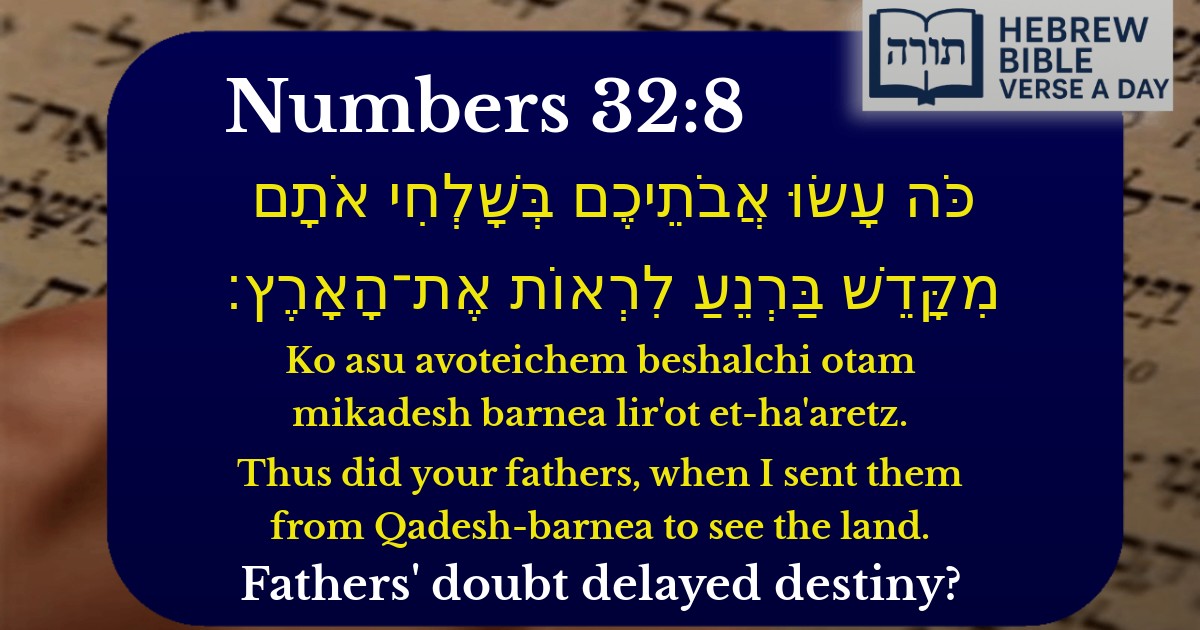Frequently Asked Questions
Q: What does Numbers 32:8 mean?
A: Numbers 32:8 refers to the incident when Moshe (Moses) sent the twelve spies from Kadesh-barnea to scout the Land of Israel. The verse reminds the Jewish people of their ancestors' lack of faith when the spies returned with a negative report, causing the nation to hesitate about entering the land (Rashi on Numbers 32:8).
Q: Why is the story of the spies in Numbers 32:8 important?
A: This story is important because it teaches us about the consequences of lacking faith in Hashem's promises. The generation that left Egypt was punished with 40 years in the wilderness because they believed the spies' fearful report rather than trusting in Hashem (Talmud Sotah 34b). It serves as a lesson about the importance of trust in Hashem.
Q: What can we learn from Numbers 32:8 today?
A: We learn that even when challenges seem great, we must have faith in Hashem's plan. Just as the spies saw obstacles instead of opportunities, we must be careful not to let fear prevent us from fulfilling our mission (Rambam, Hilchot De'ot 1:4 on proper perspective).
Q: Where was Kadesh-barnea mentioned in Numbers 32:8?
A: Kadesh-barnea was an important encampment in the wilderness, located at the southern border of the Land of Israel. It was from here that the spies were sent to scout the land (Rashi on Numbers 13:26). Today, scholars identify it with the area of Ein el-Qudeirat in the Sinai/Negv region.
Q: How does Numbers 32:8 connect to the rest of the Torah?
A: This verse connects to the larger theme of the Jewish people's journey to the Promised Land. It references the pivotal moment when the generation that left Egypt lost their chance to enter Israel, showing how one moment of doubt can have long-lasting consequences (Midrash Tanchuma, Shelach 7).


Context in Sefer Devarim
This verse (Devarim 1:22) appears in Moshe Rabbeinu's recounting of the episode of the Meraglim (spies) sent to scout Eretz Yisrael. The verse serves as a rebuke to Bnei Yisrael for repeating the sins of their fathers, particularly the lack of faith demonstrated during the incident of the spies.
Rashi's Explanation
Rashi explains that the phrase "כֹּה עָשׂוּ אֲבֹתֵיכֶם" ("Thus did your fathers") refers to the improper request to send spies to assess the land. He notes that while Hashem had already promised them a good land, they sought human verification rather than relying on divine assurance (Rashi on Devarim 1:22). This demonstrated a lack of complete faith in Hashem's word.
Rambam on the Sin of the Spies
In Moreh Nevuchim (1:8), Rambam discusses how the sin of the spies stemmed from a failure to internalize the miracles they had witnessed. Despite seeing Hashem's power in Egypt and the wilderness, they still doubted His ability to bring them into the land, showing a fundamental lack of bitachon (trust).
Midrashic Insights
Kadesh Barnea as a Turning Point
The mention of Kadesh Barnea is significant, as it was the site where the nation's rebellion reached its climax. Malbim notes that this location became synonymous with missed opportunity, as it marked the beginning of 40 years of wandering due to their lack of faith.
Contemporary Lesson from the Verse
The Kli Yakar teaches that this verse serves as a perpetual warning against allowing fear to override faith. Just as the generation of the spies allowed their anxieties to distort reality, we must guard against letting worldly concerns eclipse our trust in Hashem's providence.